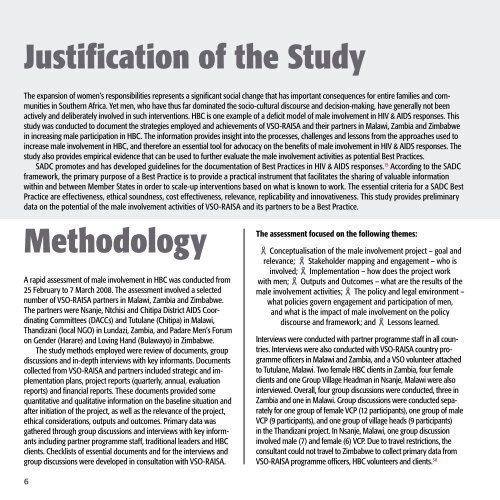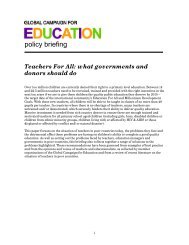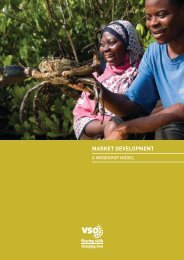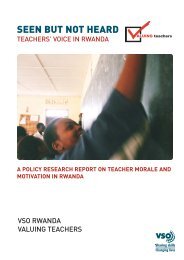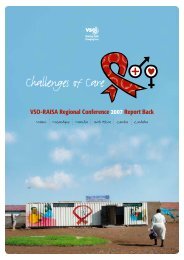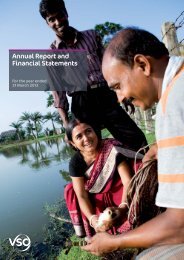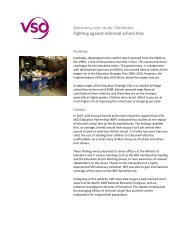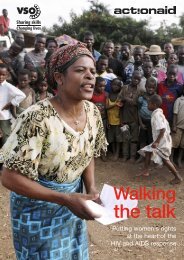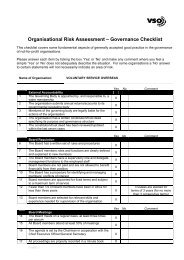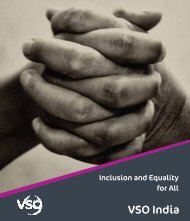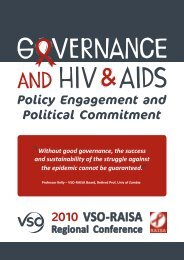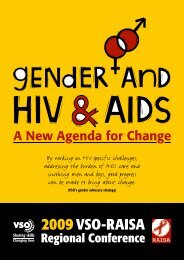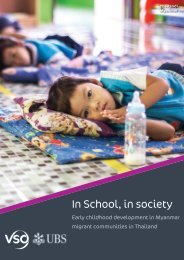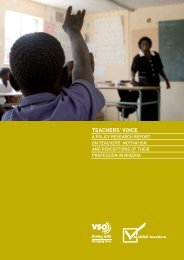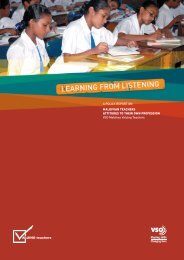Increased Male Involvement in Home-based Care to Reduce ... - VSO
Increased Male Involvement in Home-based Care to Reduce ... - VSO
Increased Male Involvement in Home-based Care to Reduce ... - VSO
- No tags were found...
You also want an ePaper? Increase the reach of your titles
YUMPU automatically turns print PDFs into web optimized ePapers that Google loves.
Justification of the StudyThe expansion of women’s responsibilities represents a significant social change that has important consequences for entire families and communities<strong>in</strong> Southern Africa. Yet men, who have thus far dom<strong>in</strong>ated the socio-cultural discourse and decision-mak<strong>in</strong>g, have generally not beenactively and deliberately <strong>in</strong>volved <strong>in</strong> such <strong>in</strong>terventions. HBC is one example of a deficit model of male <strong>in</strong>volvement <strong>in</strong> HIV & AIDS responses. Thisstudy was conducted <strong>to</strong> document the strategies employed and achievements of <strong>VSO</strong>-RAISA and their partners <strong>in</strong> Malawi, Zambia and Zimbabwe<strong>in</strong> <strong>in</strong>creas<strong>in</strong>g male participation <strong>in</strong> HBC. The <strong>in</strong>formation provides <strong>in</strong>sight <strong>in</strong><strong>to</strong> the processes, challenges and lessons from the approaches used <strong>to</strong><strong>in</strong>crease male <strong>in</strong>volvement <strong>in</strong> HBC, and therefore an essential <strong>to</strong>ol for advocacy on the benefits of male <strong>in</strong>volvement <strong>in</strong> HIV & AIDS responses. Thestudy also provides empirical evidence that can be used <strong>to</strong> further evaluate the male <strong>in</strong>volvement activities as potential Best Practices.SADC promotes and has developed guidel<strong>in</strong>es for the documentation of Best Practices <strong>in</strong> HIV & AIDS responses. 15 Accord<strong>in</strong>g <strong>to</strong> the SADCframework, the primary purpose of a Best Practice is <strong>to</strong> provide a practical <strong>in</strong>strument that facilitates the shar<strong>in</strong>g of valuable <strong>in</strong>formationwith<strong>in</strong> and between Member States <strong>in</strong> order <strong>to</strong> scale-up <strong>in</strong>terventions <strong>based</strong> on what is known <strong>to</strong> work. The essential criteria for a SADC BestPractice are effectiveness, ethical soundness, cost effectiveness, relevance, replicability and <strong>in</strong>novativeness. This study provides prelim<strong>in</strong>arydata on the potential of the male <strong>in</strong>volvement activities of <strong>VSO</strong>-RAISA and its partners <strong>to</strong> be a Best Practice.MethodologyA rapid assessment of male <strong>in</strong>volvement <strong>in</strong> HBC was conducted from25 February <strong>to</strong> 7 March 2008. The assessment <strong>in</strong>volved a selectednumber of <strong>VSO</strong>-RAISA partners <strong>in</strong> Malawi, Zambia and Zimbabwe.The partners were Nsanje, Ntchisi and Chitipa District AIDS Coord<strong>in</strong>at<strong>in</strong>gCommittees (DACCs) and Tutulane (Chitipa) <strong>in</strong> Malawi,Thandizani (local NGO) <strong>in</strong> Lundazi, Zambia, and Padare Men’s Forumon Gender (Harare) and Lov<strong>in</strong>g Hand (Bulawayo) <strong>in</strong> Zimbabwe.The study methods employed were review of documents, groupdiscussions and <strong>in</strong>-depth <strong>in</strong>terviews with key <strong>in</strong>formants. Documentscollected from <strong>VSO</strong>-RAISA and partners <strong>in</strong>cluded strategic and implementationplans, project reports (quarterly, annual, evaluationreports) and f<strong>in</strong>ancial reports. These documents provided somequantitative and qualitative <strong>in</strong>formation on the basel<strong>in</strong>e situation andafter <strong>in</strong>itiation of the project, as well as the relevance of the project,ethical considerations, outputs and outcomes. Primary data wasgathered through group discussions and <strong>in</strong>terviews with key <strong>in</strong>formants<strong>in</strong>clud<strong>in</strong>g partner programme staff, traditional leaders and HBCclients. Checklists of essential documents and for the <strong>in</strong>terviews andgroup discussions were developed <strong>in</strong> consultation with <strong>VSO</strong>-RAISA.The assessment focused on the follow<strong>in</strong>g themes:-Conceptualisation of the male <strong>in</strong>volvement project – goal andrelevance; - Stakeholder mapp<strong>in</strong>g and engagement – who is<strong>in</strong>volved;- Implementation – how does the project workwith men;-Outputs and Outcomes – what are the results of themale <strong>in</strong>volvement activities;- The policy and legal environment –what policies govern engagement and participation of men,and what is the impact of male <strong>in</strong>volvement on the policydiscourse and framework; and- Lessons learned.Interviews were conducted with partner programme staff <strong>in</strong> all countries.Interviews were also conducted with <strong>VSO</strong>-RAISA country programmeofficers <strong>in</strong> Malawi and Zambia, and a <strong>VSO</strong> volunteer attached<strong>to</strong> Tutulane, Malawi. Two female HBC clients <strong>in</strong> Zambia, four femaleclients and one Group Village Headman <strong>in</strong> Nsanje, Malawi were also<strong>in</strong>terviewed. Overall, four group discussions were conducted, three <strong>in</strong>Zambia and one <strong>in</strong> Malawi. Group discussions were conducted separatelyfor one group of female VCP (12 participants), one group of maleVCP (9 participants), and one group of village heads (9 participants)<strong>in</strong> the Thandizani project. In Nsanje, Malawi, one group discussion<strong>in</strong>volved male (7) and female (6) VCP. Due <strong>to</strong> travel restrictions, theconsultant could not travel <strong>to</strong> Zimbabwe <strong>to</strong> collect primary data from<strong>VSO</strong>-RAISA programme officers, HBC volunteers and clients. 306


